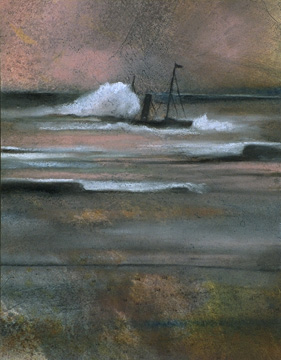1865, The Brother Jonathan, sank off Crescent City.
.
 FACTS
FACTS
 The Brother Jonathan was a 221 foot steamer
that was extensively refitted by new owners in 1861. Placed in service
in the San Francisco - Portland - Victoria run, she boasted unequaled accommodations.
Her passenger list frequently included prominent San Francisco and Portland
business leaders, government employees, entertainers and miners.
The Brother Jonathan was a 221 foot steamer
that was extensively refitted by new owners in 1861. Placed in service
in the San Francisco - Portland - Victoria run, she boasted unequaled accommodations.
Her passenger list frequently included prominent San Francisco and Portland
business leaders, government employees, entertainers and miners.
On a voyage from San Francisco
in 1865 she was heavily overloaded with cargo despite the strenuous objection
of her captain. Waterfront observers noticed how low in the water the ship
rode with its cargo which included woolen mill machinery, mining equipment
and "two camels, some horses and a Newfoundland dog."
A gale kicked up as soon as
the ship left port and worsened as the voyage proceeded. Around 1 o'clock
on the afternoon of July 30 the ship passed Crescent City. Increasingly
heavy seas forced the captain to turn toward the harbor. As she approached
Crescent City the Brother Jonathan hit the St. George Reef with a jarring
impact throwing the passengers and crew to the deck. Three lifeboats were
launched but only one avoided being capsized by the heavy seas. A geyser
of water erupted through the foredeck as a rock punched a hole in the hull.
She soon slipped off the reef and sank within forty-five minutes while
onlookers watched helplessly from the high bluffs above the town. Boats
launched from shore found nothing but empty sea on reaching the scene.
Only nineteen of 232 passengers survived.
Among the passengers was James
Nisbet, editor and part owner of the San Francisco Bulletin. In the forty-five
minutes it took the ship to sink, Nisbet calmly sat down and wrote out
his will using a pencil so that sea water would not wash away his effort.
The will divided his estate between his brother and sister but made a special
bequest of $5,000 dollars in gold to Almira Hopkins, the wife of San Francisco
insurance agent Caspar Hopkins. He put the will, along with a note to Hopkins'
wife, in his breast pocket, and wrapped himself in two life preservers.
His body was washed ashore two days later when the will and the letter
were found. The letter to Almira read,
My dear Almira,
A thousand affectionate adieus,
You spoke of my sailing on Friday -- Hangman's Day -- and the unlucky Jonathan.
Well here I am with death before me. My love to you all -- to Caspar, to
Dita, to Belle, to Mellie and little Myra -- kiss her for me. Never forget
Grandpa.
.
FICTION
 Between the Lines
(The letter to Almira, if he'd had more time and privacy)
Between the Lines
(The letter to Almira, if he'd had more time and privacy)
My dear Almira,
A thousand affectionate adieus,
I have just written my will
as the ship
is sinking fast and your face,
framed with its dark curls and illuminated by
your smile flashes before my eyes.
You spoke of my sailing on Friday --
Hangman's Day and the unlucky Jonathan.
You were right and so was the captain.
He objected to the heavy cargo.
The two camels tethered and bellowing on the deck
seem now a testament to the folly of the ship's owners.
A half an hour
ago we hit something.
I was thrown to the deck,
then I saw the keel float alongside
and a geyser
of water came shooting up through the foredeck.
Well here I am with death before me.
But I sense you with me.
I have left
you $5,000 in gold.
I hope Caspar doesn't sense
an impropriety.
My love to you all --
to Caspar, to Dita, to Belle, to Mellie and little Myra --
And especially to you, my love.
Protect
yourself and the child,
kiss her for me.
I know you'll see in her face a glimpse
of me
that will always remind you of my love,
a
love that will not be drowned by these ragingwaters.
Adeiu,
Never forget Grandpa.
 FACTS
FACTS FACTS
FACTS